Oration
ABOUT HUMANENESS, HEROISM AND THE OTHER SIDE OF THE MEDAL
The inexorable mirror
In Law School in Belgrade every year there is a competition in rhetoric, creatively continuing the long tradition of eloquence in Serbia. “National Journal” is publishing the text “Thank you, immortal heroes” which, pronounced on this year’s rhetoric review, brought his author a victory. The text is adjusted for the purpose of publishing in this magazine.
By: Miloš Stanković
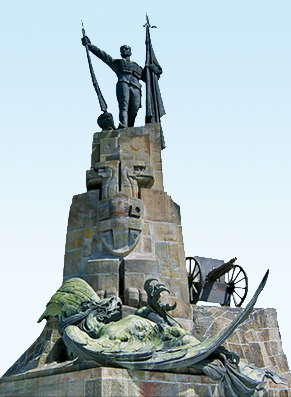 – I came here to fight! – said the boy to the surprised defenders from the barricades near the National Theatre. He wasn’t more than 14 years old. He had a carbine hanging over his arms and a piece of bread in his hand.
– I came here to fight! – said the boy to the surprised defenders from the barricades near the National Theatre. He wasn’t more than 14 years old. He had a carbine hanging over his arms and a piece of bread in his hand.
Suddenly, the first Austrian horsemen came from Dorćol. After rejecting two attacks, the small number of survivors got into slavery. The Austrians decided to shoot them all.
– Where did you come from? The officer asked the boy.
– I am fighting, said the boy.
– You know you’re gonna get shot now?
– I know.
– So?
– Whatever....
However, the boy said to the officer that he wanted to go to town to find some bread for his mother, and he asked him to release him just for a few minutes, not more, so that he can take what he found to his sick mother, and than come back. The officers let him do this, happy because the boy won’t get shot after all. The boy ran, he issued his order and the shooting began. The Austrians already planned to continue towards Terazije when they caught sight of a small figure running towards them and they recognized the little boy. He stood besides the wall where his dead friends from the barricades were lying, and then he turned around, ripped his shirt, stuck out his chest and said out of spite with hatred:
Why don’t you shoot?
The soldiers were petrified.
– What are you waiting for? Said the boy, even more decisive.
Like woken up from a deep sleep, the officer gave a sign, the soldiers took their rifles and aimed at the little boy.
Three rifles burst and the boy was lying dead on the ground.
HOMELAND IS AN ETHICS
Other sad pictures of the fall of 1915 reminded us of the saying goodbye with the dying and of the last honor to a nation and to a country. The British reporter John Reed informs from Šabac and Valjevo that Serbia is a country of death. Immense lines loaded with home furnishings and horse carts stuck in mud carrying the national archive, national and religious relics and sacred things. Experienced soldiers, the victors of Bregalnica and Jedren, of Cer and Kolubara, with tears in their eyes, praising the worn-out cannon barrels bury their guns before the penetrating enemy. Almost a biblical image; the old and exhausted king on a cart, just as Moses, started out with his people, the total state administration, the government and the parliament to exile. This voyage will be the most tragic thing ever marked in the history of the world by the judgment of the French marshal Joseph Geoffroy.
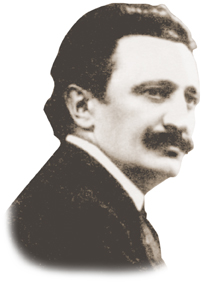 Branislav Nušić said, climbing the Albanian Golgotha himself, that “Homeland is not a limited object, with borders and embodied; the homeland is a thought, homeland is faith, and thought and faith do not die.” That is why they “were shot, they died of thirst and hunger, they were crucified on the cross of Golgotha, but they never lost their strong faith in the final victory”, says Vojislav Ilić Junior. In the Albanian roadless areas there has left forever, with no name or memory, 217.000 civilians and soldiers. On the bottom of the Ionic Sea, in the Blue Crypt, more than 15.000 apostles found their eternal peace. The price of freedom in Serbia had to be paid by every second man. But this army and this nation silently suffered, without grumbling, as Jesus Christ himself, for us to live today. And they suffered instead of us. And how did we repay them?
Branislav Nušić said, climbing the Albanian Golgotha himself, that “Homeland is not a limited object, with borders and embodied; the homeland is a thought, homeland is faith, and thought and faith do not die.” That is why they “were shot, they died of thirst and hunger, they were crucified on the cross of Golgotha, but they never lost their strong faith in the final victory”, says Vojislav Ilić Junior. In the Albanian roadless areas there has left forever, with no name or memory, 217.000 civilians and soldiers. On the bottom of the Ionic Sea, in the Blue Crypt, more than 15.000 apostles found their eternal peace. The price of freedom in Serbia had to be paid by every second man. But this army and this nation silently suffered, without grumbling, as Jesus Christ himself, for us to live today. And they suffered instead of us. And how did we repay them?
SOWING, HARVEST AND MERITS
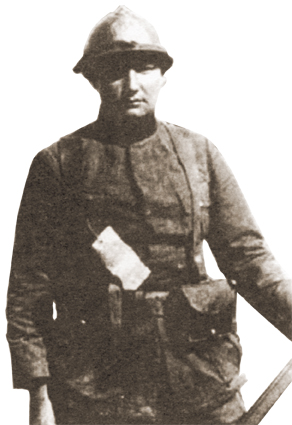 On this very day in 1949, in Đakovica, by the order of the authorities, a beautiful church was blown up, the commemoration mausoleum of thousands of killed Serbian children in Albanian. From the rests of the church and from children’s bones, public toilets were built in Đakovica. Today, Serbia is not celebrating the victor of Cer, but the one who put the imitation of his sheepskin hat; Serbs do not read memories of the victors of Kolubara but the memoirs of a legionnaire; Serbia does not respect the one who was carried on improvised stretcher by his soldiers across Albania, but the one who hid from the army and from the people!
On this very day in 1949, in Đakovica, by the order of the authorities, a beautiful church was blown up, the commemoration mausoleum of thousands of killed Serbian children in Albanian. From the rests of the church and from children’s bones, public toilets were built in Đakovica. Today, Serbia is not celebrating the victor of Cer, but the one who put the imitation of his sheepskin hat; Serbs do not read memories of the victors of Kolubara but the memoirs of a legionnaire; Serbia does not respect the one who was carried on improvised stretcher by his soldiers across Albania, but the one who hid from the army and from the people!
Milunka Savić, wounded six times, the holder of two Karađorđe’s stars, the medal Obilić and the French “Legion of Honor”, supported herself as a self-supporting mother of four children working as a cleaning lady. The mother of Gavrilo Princip survived out of charity! Momčilo Gavrić, as an eleven year old, was left with no family, and withdraws across Albania with the Drina division and became the youngest officer in World War I, and died as a poor pensioner. Milan Stojadinović, the responsible for the financing of the Serbian state on the island of Corfu, the man who participated the building of the commemoration mausoleum to the Serbian heroes on Vid with his private means, was expelled from Serbia in 1940 as a traitor. Slobodan Jovanović, our greatest lawyer, is still not rehabilitated! Major Dragutin Gavrilović who was shoot and took his unit across Albania, the same one that the supreme command forgot, was buried after World War II without any honors, in the British uniform, because his Serbian uniform was took by the revolutionary government.
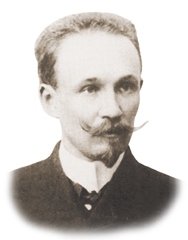 If it was not like that, would the painter Mihailo Milovanović, the founder of the Society of Fine Arts, be shot in the Republic of Užice under the accusation that he was a British spy? Would Jovan Dučić die in the emigration as a national enemy, while his work was forbidden in his homeland? Doctor Archibald Reiss, the professor of Criminology on the University in Laussanne, invited by the Serbian government to investigate and present the horrors of the Austro-Hungarian army in Mačva and Podrinje to the world, and who spent his property to the financing of Serbian refugees, whose body rests in peace on Topčider and his heart on Kajmakčalan, died after the fight with a Serbian railroad employee. They all crossed Albania, as well as Rastko Petrović and Mika Alas and Dis and Stanislav Binički and political leaders Ljuba Davidović and Andra Nikolić. They truly shared the fate of their people.
If it was not like that, would the painter Mihailo Milovanović, the founder of the Society of Fine Arts, be shot in the Republic of Užice under the accusation that he was a British spy? Would Jovan Dučić die in the emigration as a national enemy, while his work was forbidden in his homeland? Doctor Archibald Reiss, the professor of Criminology on the University in Laussanne, invited by the Serbian government to investigate and present the horrors of the Austro-Hungarian army in Mačva and Podrinje to the world, and who spent his property to the financing of Serbian refugees, whose body rests in peace on Topčider and his heart on Kajmakčalan, died after the fight with a Serbian railroad employee. They all crossed Albania, as well as Rastko Petrović and Mika Alas and Dis and Stanislav Binički and political leaders Ljuba Davidović and Andra Nikolić. They truly shared the fate of their people.
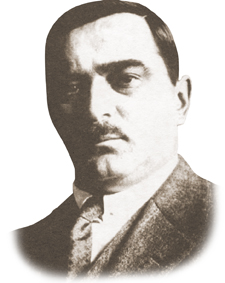 Are there among all of you, gentlemen politicians, someone who would defend the honor of its homeland with their sons’ lives like Andra Nikolić or Nušić? Is there any one tonight, among all of you, who would sing the Serbian anthem as the major Todorović while being burned, or, as lieutenant Gajić who would show the three Serbian flags instead the white one on the call for the capitulation of Belgrade?
Are there among all of you, gentlemen politicians, someone who would defend the honor of its homeland with their sons’ lives like Andra Nikolić or Nušić? Is there any one tonight, among all of you, who would sing the Serbian anthem as the major Todorović while being burned, or, as lieutenant Gajić who would show the three Serbian flags instead the white one on the call for the capitulation of Belgrade?
They are also common people, peasants, modest and reserved, but proud, firm and free. They are Dragutin Matić, the private from the famous war photograph according to whose profile a Japanese psychologist made the unique psychophysical study about this soldier’s tension. They are also my grand grandfathers Krsta and Jeremija. They are your ancestors.
But, did those ancestors deserve descendants like these? Or: did we deserve these ancestors? That is why I am begging for your heart to beat for just a moment as cannons on Tekeriš, for your soul to dance March on Drina, for your ears hear the words of major Gavrilović, for your breast to tighten with There, Far Away, for your thoughts to be devoted for your grand grandfathers and may anyone of us say: THANK YOU, IMMORTAL HEROES!
***
“Homeland is not a limited object, with borders and embodied; the homeland is a thought, homeland is faith, and thought and faith do not die.” (Branislav Nušić)
***
“Are there among all of you, gentlemen politicians, someone who would defend the honor of its homeland with their sons’ lives like Andra Nikolić or Nušić?”
